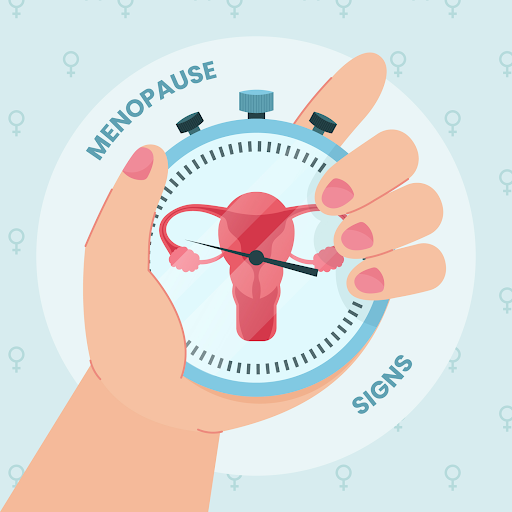What is Menopause?
Menopause is when a woman stops having her menstrual cycles. It’s officially diagnosed after 12 consecutive months without a period. Menopause usually happens around age 50 and marks the end of a woman’s ability to have children.Hormonal Changes During Menopause
During menopause, there are significant changes in hormone levels:- Estrogen and Progesterone Decline: The ovaries produce less of these important hormones, which affects various functions in the body.
- Follicle-Stimulating Hormone (FSH) Increase: When estrogen levels go down, FSH levels go up. This is often used as a marker in tests.
Understanding Menopause and Perimenopause
It’s important to know the difference between menopause and perimenopause:- Perimenopause: This is the time leading up to menopause, which can last for several years. During this phase, women may experience symptoms like irregular periods and hot flushes.
- Menopause: This is confirmed when a woman hasn’t had her period for a full year.
- Postmenopause: This stage comes after menopause and lasts for the rest of a woman’s life.
Common Symptoms of Menopause
Menopause brings a variety of physical symptoms that can impact daily life. Understanding these symptoms helps in managing them effectively.1. Physical Symptoms
Hot Flushes:
These are sudden feelings of warmth that spread across your body, often most intense over the face, neck, and chest. Hot flushes can cause redness and sweating, sometimes leading to discomfort. They may last from a few seconds to several minutes.Night Sweats:
Night sweats are essentially hot flushes that occur during sleep. They can lead to excessive sweating, causing disruptions in your sleep quality. Waking up drenched in sweat can be distressing and may contribute to insomnia or fatigue during the day.Vaginal Dryness:
Reduced estrogen levels cause the vaginal tissues to become drier and thinner. This can result in discomfort or pain during intercourse, potentially impacting sexual health and intimacy. Over-the-counter lubricants or prescription treatments can help alleviate this symptom.Musculoskeletal Pain:
Hormonal changes during menopause can affect your muscles and joints, leading to aches and pains. This musculoskeletal pain often stems from decreased estrogen levels which play a role in maintaining bone density and joint health. For those seeking professional care, the Broadbeach Family Practice offers comprehensive solutions tailored to individual needs. Broadbeach Family Practice Details provide more information on available services. Understanding these common symptoms of menopause is crucial for identifying appropriate treatments and improving quality of life during this natural transition.
2. Psychological Symptoms
Menopause impacts not only the body but also the mind. The hormonal changes during this phase often lead to significant psychological symptoms, which can be just as challenging as the physical ones.1. Mood Swings and Emotional Fluctuations
A common symptom of menopause includes abrupt changes in mood. Women might experience heightened irritability, unexplained sadness, or bursts of anger. These emotional fluctuations can be unsettling and impact daily life.2. Increased Anxiety or Risk of Depression
Many women report increased anxiety levels or depressive symptoms during menopause. These mental health challenges are linked to the hormonal shifts that occur during this time. It’s not uncommon to feel heightened worry or a sense of hopelessness.3. Importance of Mental Health Support During This Phase
Addressing psychological symptoms is crucial. Seeking support from a mental health professional can provide strategies for managing mood swings, anxiety, and depression. Open communication with loved ones and healthcare providers helps in developing a comprehensive care plan tailored to your needs. Understanding these psychological aspects ensures a holistic approach to managing menopause, recognising that mental well-being is just as important as physical health during this transition.3. Other Symptoms
1. Sleep Disturbances and Insomnia
Menopause often brings sleep problems, including insomnia. Night sweats can disrupt sleep, leaving you feeling tired and unrested. Hormonal changes may also lead to difficulties in falling or staying asleep.2. Weight Gain Patterns Associated with Hormonal Shifts
Weight gain during menopause is another common issue. Hormonal imbalances can affect metabolism, leading to increased fat storage, especially around the abdomen. Maintaining a balanced diet and regular exercise can help manage this symptom.3. Effects on Libido and Sexual Desire
Decreased libido is frequently reported during menopause. Lower estrogen levels can reduce sexual desire and arousal. Vaginal dryness might also contribute to discomfort during intercourse, affecting overall sexual health. Understanding these symptoms helps in addressing them effectively. By being aware of these issues, you can take appropriate steps towards managing them and maintaining a better quality of life during menopause.Diagnosis and Treatment Options for Menopause Symptoms
How Healthcare Providers Diagnose Menopause
Healthcare providers diagnose menopause through a combination of patient history, symptom assessment, and sometimes blood tests. A thorough discussion about menstrual history, changes in cycle patterns, and the presence of menopausal symptoms is essential. Blood tests may measure levels of follicle-stimulating hormone (FSH) and estrogen to confirm menopause.Importance of Discussing Symptoms Openly
Open communication with a healthcare provider is crucial for effective management. Discussing symptoms like hot flushes, night sweats, and mood changes helps in tailoring a personalised treatment plan.Treatment options include:
- Hormone Therapy (HT): Alleviates moderate to severe symptoms.
- Non-hormonal Medications: Wide range of options including supplements, non-hormonal medications, psychological support and intervention, weight loss medications.
- Lifestyle Changes: Improved diet and regular exercise.
- Over-the-counter Products: Vaginal lubricants for dryness.
Conclusion
It’s important to get professional help when dealing with menopausal symptoms. A healthcare provider can work with you to create a care plan that’s just right for you. Talking openly about your symptoms and worries can lead to better strategies for managing them and an overall better quality of life. Don’t hesitate to reach out and take charge of your health during this important time.FAQs (Frequently Asked Questions)
What are the common physical symptoms of menopause?
Common physical symptoms include hot flashes, night sweats, vaginal dryness, and musculoskeletal pain. These symptoms can significantly impact daily life and well-being.
How do psychological symptoms manifest during menopause?
During menopause, women may experience mood swings, increased anxiety, and depressive symptoms. It is crucial to acknowledge these psychological aspects and seek mental health support when needed.
What other symptoms might women experience during menopause?
In addition to physical and psychological symptoms, women may face sleep disturbances, weight gain, and decreased libido. These changes are often linked to hormonal shifts during this phase.
How is menopause diagnosed?
Healthcare providers diagnose menopause by evaluating a woman's medical history and discussing her symptoms openly. Blood tests may also be conducted to measure hormone levels if necessary.
What treatment options are available for managing menopause symptoms?
Treatment options vary based on individual needs but may include hormone replacement therapy (HRT), lifestyle changes, and alternative therapies. It's important to consult with a healthcare provider for personalized care plans.




